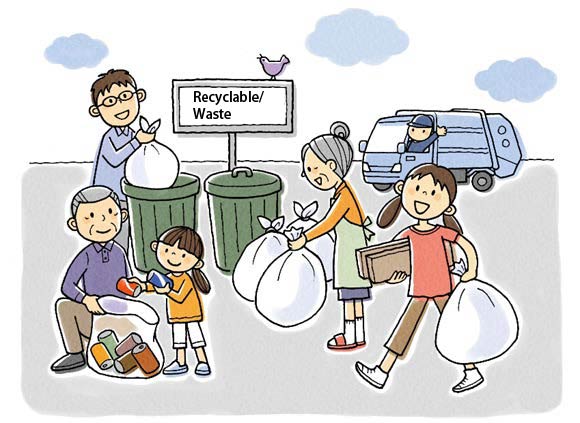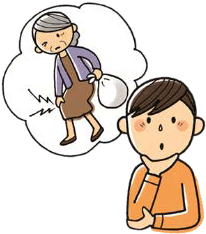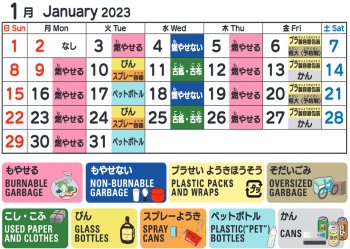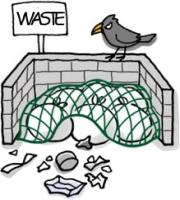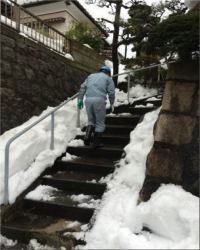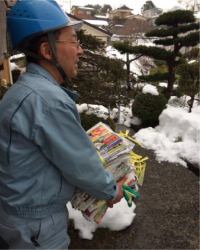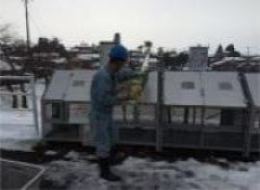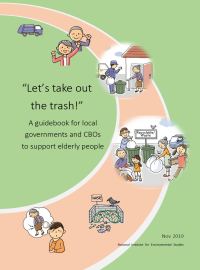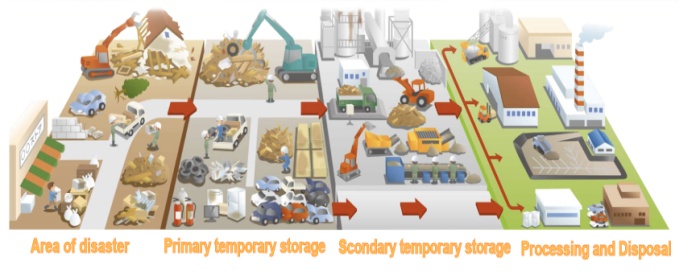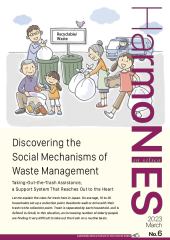HarmoNIES No.6
Discovering the Social Mechanisms of Waste Management
Discovering the Social Mechanisms of
Waste Management
Waste Management
Taking-Out-the-Trash Assistance, a Support System That Reaches Out to the Heart
Keywords: Local community Neighborhood association, Super-aged society, Taking-Out-the-Trash, Waste collection point
”Just like a kind-hearted neighbor who is eager to learn
a rare language to help a person in need who speaks a different language
from their own.”
Let me explain the rules for trash here in Japan. On average, 10 to 20 households set up a collection point. Residents walk or drive with their trash to the collection point. Trash is separated by each household into burnable trash, non-burnable trash, food waste, plastic, PET bottles, cans and paper, etc. The rules for trash separation differ slightly from municipality to municipality. The frequency and collection days are also different. In this situation, an increasing number of elderly people are finding it very difficult to take out the trash on a routine basis.
Is Taking Out the Trash a Challenge for the Elderly?
It can be a hassle for anyone to carry heavy trash to the collection point, which can be more than 500 meters away for some people. Moreover, as people get older and cannot do things as well as they did in their youth, they may fall and hurt themselves while carrying trash, or find it difficult to understand the rules. This can make them feel overwhelmed when they put out the trash. They can even lose their energy and let their trash pile up in their house. Japan is now a super-aged society, with nearly 30% of the population over the age of 65. The elderly population is still growing.
Dr. Ryo Tajima is researching issues related both to the environment and to society. For the elderly, this includes taking out the trash. In this issue, I interviewed him about his research on a "Taking-Out-the-Trash Support" system in which local government officials and community members assist the elderly in taking out their trash. Dr. Tajima says that he came to the conclusion that the the key to addressing social and environmental issues lies not only in the efforts of individuals but also in creating social systems. This led him to focus his research on the mechanisms of social systems.
Dr. Ryo Tajima is researching issues related both to the environment and to society. For the elderly, this includes taking out the trash. In this issue, I interviewed him about his research on a "Taking-Out-the-Trash Support" system in which local government officials and community members assist the elderly in taking out their trash. Dr. Tajima says that he came to the conclusion that the the key to addressing social and environmental issues lies not only in the efforts of individuals but also in creating social systems. This led him to focus his research on the mechanisms of social systems.
What Kind of Systems Would be Helpful?
Dr. Tajima is researching and analyzing the social rules and systems related to waste management and the behavior of people living under these rules and systems. His goal is to find mechanisms that will lead to solutions to social and environmental issues. Support for elderly people for taking out their trash is one of those measures. According to Dr. Tajima, the research begins with an understanding of the current situation and an exploration of what kind of systems would be effective.
Undiscovered and Careful Efforts
The first step Dr. Tajima took to understand the support system for the elderly in taking out their trash was to conduct a survey and interviews to carefully gather feedback from members of the local community as well as the government staff. Before starting the survey, he made careful preparations in cooperation with the local government. This preparation is essential for good research results and to gain the understanding and cooperation of those who reply to the survey. Clear explanation of the purpose of the survey—namely, to understand the current status of taking out the trash for the elderly and to find solutions for the support they need—was essential. And before conducting the survey, the research team made assumptions about what kind of support might be important, or what challenges might arise during support, so that the right questions are asked.
Such careful preparation enabled his research team to receive answers that were relevant to what they needed to know. The data collected can be logically explained by analyzing it statistically, applying public policy concepts and theories, and analyzing the actual situation in various ways social scientists are familiar with. Through this process, the outline of the support system for taking out the trash as a solution for multiple local issues, such as community ties and welfare, becomes clear. It can then be presented as a proposal for improvement.
Conducting such research is a difficult task for individual citizens. All of this preparation before and after the survey may not draw anyone's attention, but it is a very careful effort. Just like a kind-hearted neighbor who is eager to learn a rare language to help a person in need who speaks a different language from their own.
Dr. Tajima’s work does not stop there. Even after compiling the results of the research, he is providing useful information to launch the system and to keep the system sustainable. For example, he shares real examples of municipalities that have already implemented the system. He also suggests ways to reduce the burden on the local government by getting the cooperation of the local community and to make residents feel more secure about the system.
Heartwarming Effects
Among the comments from local government officials are “the life of elderly households has become more lively,” “the effect of watching over people who live alone has made them feel safer and actually saved lives,” and “it has prevented people from their homes overflowing with trash”. Just the thought of having someone who cares about you is enough to cheer you up. Caring and warm attention reaches the hearts of elderly people who may be feeling lonely must be a heartwarming experience. It warms Dr. Tajima’s heart to know that his research helps people in such a personal way.
The Road Ahead for Research
The need for assistance to the elderly for taking out their trash will increase, and solutions will have greater effects as our elderly population grows. I would like to express appreciation to Dr. Tajima and to the local government for administering this support system. We all grow old at some point.
Beyond this topic of assistance for taking out the trash, Dr. Tajima also conducts a wide range of research on waste management, including disaster waste resulting from earthquakes and floods, as well as trash along the canals in southeast Asia. He continues his quest to discover social systems related to trash and hopes to make the systems friendly and accessible to all.
Beyond this topic of assistance for taking out the trash, Dr. Tajima also conducts a wide range of research on waste management, including disaster waste resulting from earthquakes and floods, as well as trash along the canals in southeast Asia. He continues his quest to discover social systems related to trash and hopes to make the systems friendly and accessible to all.
Examples of Assistance to Taking Out the Trash
"Taking-Out-the-Trash Support" is a support program for elderly people who have difficulty taking out the trash. Here, government employees, cleaning service providers, and local residents help the elderly take out their trash and collect it for them. There are various systems depending on who carries the trash and to where. We describe an example from Niigata City, which has already introduced this system (Pictures 1, 2 and 3).
The Importance of Social Mechanisms for the Disposal of Disaster Waste
In order to have smooth handling of the disposal of waste generated by disasters, cooperation among the government, the citizen sector (neighborhood associations, volunteers, etc.), and the private sector (disposal companies, etc.) is highly important. For this reason, Dr. Tajima is also researching the mechanisms (governance) needed to achieve this goal. (Figure 2)
Related Papers
- Suzuki, K., Tajima, R. (2019). Issues of Garbage Discharge in a Super Aging Society. Journal of Japan Waste Management Association (Japanese), 72 (348), 97-102
- Kojima, E., Tajima, R. (2017). Local Government Policies to Support Garbage Disposal for the Elderly :Cases and Characteristics of Support Types. Material Cycles and Waste Management Research (Japanese), 28 (3), 177-185
- Kojima, E., Tajima, R., Ju, M., Sato, M., Matsukami, H., Jimbo, Y. (2015). Mutual and Public Support System for the Disposal of Garbage for Elderly People: Psychological Factors Affecting Willingness to Use the System. Journal of the Japan Society of Material Cycles and Waste Management (Japanese), 26, 117-127
photography: Ryo TAJIMA
Download PDF
Inquiry
International Coordination Office, Planning Division
National Institute for Environmental Studies
16-2 Onogawa, Tsukuba, Ibaraki 305-8506, Japan
e-mail: int-pub{a}nies.go.jp

